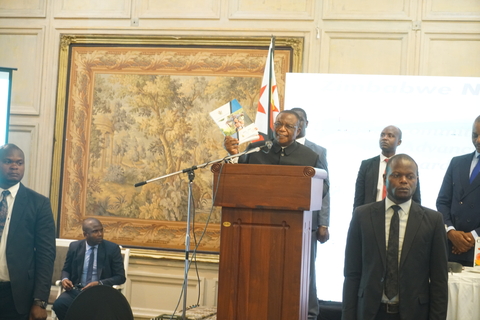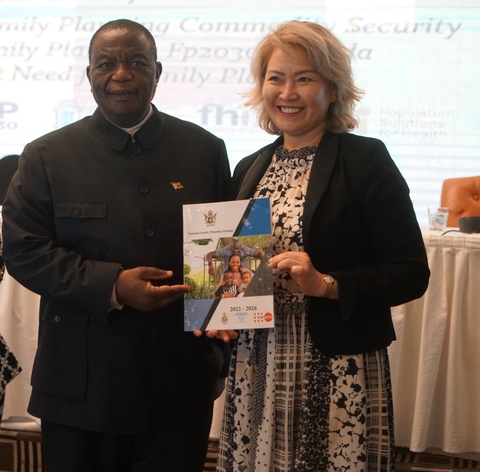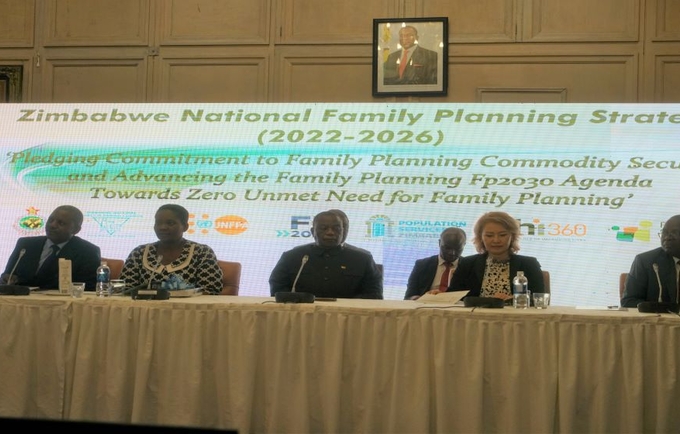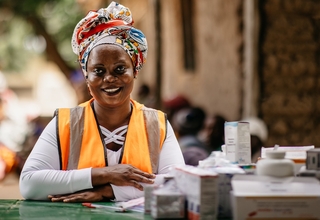Harare, Zimbabwe, 16 December 2022 – In a groundbreaking occasion, Zimbabwe launched the Family Planning 2020 commitments and Family Planning Strategy for the period 2022 – 2026, which brought unprecedented efforts by the Government, UNFPA and partners to invest in family planning.
After procuring contraceptives worth USD 1.5 million this year using domestic resources, Zimbabwe became the first country under UNFPA Supplies Partnership to qualify for the matching fund. Vice President of Zimbabwe and Minister of Health and Child Care Honourable General Dr. Constantine Guvheya Chiwenga presided over the launch of the strategy and Family Planning 2030 (FP2030) commitments.
“The Government of Zimbabwe, through the Ministry of Health and Child Care, has long been committed to providing access to contraceptive services, since independence,” said Dr. Chiwenga. “The enactment of the Zimbabwe National Family Planning Act 1985 and the establishment of the Zimbabwe National Family Planning Council marked a heightened commitment by the government to offer family planning services as part of primary health care services.

Moreover, Dr. Chiwenga said as a result of the Government’s long-standing commitment to the provision of contraceptives, Zimbabwe has earned great recognition in Africa as one of the countries with the highest rates of contraceptive use. Zimbabwe’s modern contraceptive prevalence rate is 68 per cent as of 2021. With the launch of the strategy, Dr. Chiwenga said the Government reaffirms its commitment to invest in and strengthen family planning services.
Partners in Family Planning
“The Government of Zimbabwe has been a member of the Family planning global partnership since 2012 under Family Planning 2020 (FP2020), now Family Planning 2030. Today, we reiterate our full commitment to the family planning and contraceptive service programme. While sustaining and consolidating the gains we have made, we are therefore committing to doing more for the country,” added Dr. Chiwenga.
The Ministry plays a critical role in family planning and contraceptive services in nation building by way of enhancing health and social wellbeing, saving health costs and increasing productivity. Health and well-being is one of the key pillars of the National Development Strategy 1, which is a gateway to an empowered upper-middle-income society by 2030.”
Dr. Chiwenga recently attended the International Conference on Family Planning (ICFP) 2022, the world's largest gathering of family planning and reproductive health professionals in Thailand, from 14 - 17 November 2022. The Vice President announced that at this conference Zimbabwe was selected to host the High-Level International Conference leading to the International Conference on Population and Development 30 in June 2023.
Also speaking at the launch, UNFPA Acting Country Representative Dr. Gulnara Kadrykulova said UNFPA commends the government on the investment that it is making in reproductive and maternal health, including family planning.

“Through the launch of this strategy and qualifying for the matching fund, the Government has demonstrated commitment to strengthening the health system, specifically using domestic financing to ensure commodity security and universal access to sexual and reproductive health services, including family planning,” said Dr. Kadrykulova.
At the forefront
UNFPA Zimbabwe has been at the forefront in supporting the Zimbabwean government in ensuring the availability and accessibility of voluntary contraceptives and family planning services in the country working with the MOHCC and the Zimbabwe National Family Planning Council (ZNFPC).
Family Planning is a cost-effective accelerator of improved Health outcomes. Globally, use of contraceptives is averting 2.7 million infant deaths, 215,000 maternal deaths; 187 million unintended pregnancies and 105 million abortions each year. Modelling undertaken by MOHCC and ZNFPC in 2014, confirms the benefits of family planning locally. For every additional US$1 invested in family planning, there was an additional US$2 to $4 savings in health costs
According to analysis by the FP2030, in the last 5 years (between 2018 and 2022) the use of contraceptives has averted nearly 3,6 million unintended pregnancies, almost a million (918,000) unsafe abortions and 12,700 maternal deaths in Zimbabwe.




